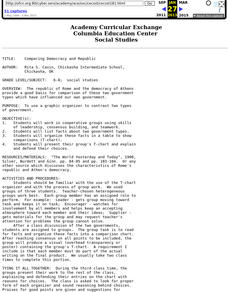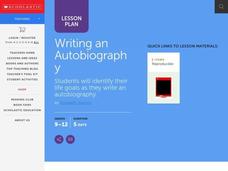Curated OER
Internet Field Trip: Simple Machines
Young scholars observe and identify the types of simple machines. They conduct research and gather data to increase the comprehension of simple machines. Students identify and comprehend data to complete a graphic organizer and focus...
Curated OER
6 Room Image Poem (adapted from Georgia Heard’s Awakening the Heart)
Students explore emotions and memories in preparation for poetry writing. In this poetry lesson students use a graphic organizer and prompts to begin to describe a specific memory which they will turned into a poem.
Curated OER
Using "Four-Square"
Third graders use a four-square graphic organizer to help a third grade writer organize thoughts and clarify thinking to write a simple expository paragraph, a workshop summary paragraph.
Classroom Adventures Program
Creating Characters
Examine character in depth. Over the course of these six lessons, learners explore their own character traits, determine the traits of characters in the books they read, practice comparing and contrasting, and collaborate in small...
EngageNY
Probability Rules (part 2)
Ensure your pupils are rule followers! Learners add the addition rule to the set of probability rules examined in the previous lesson. Problems require both the multiplication and addition rule.
Curated OER
Trade Wars: the Candidates Take a Stand
Students research topics related to trade, and develop a graphic organizer. They debate and discuss topics related to trade.
Curated OER
"A Sound of Thunder" Worksheet
For this "A Sound of Thunder" worksheet group, students complete a graphic organizer for the plot of the story. Students then complete activities with vocabulary from the reading and edit passages from the text.
Curated OER
Our Dinopals with WordArt
Elementary schoolers use the writing process steps to write a descriptive paragraph about a fictional dinosaur. Using a tech tool lesson, they create a graphic title for the paragraph. A nice blending of technology with "old-fashioned"...
Teach Engineering
Cell Celebration!
Are you eukaryotic? (Answer: Yes.) The first of six installments in the Cells units teaches pupils about the similarities and differences of prokaryotes and eukaryotes. It also covers the functions of various cell components in both...
Curated OER
Impersonating Great Poets Using "Science Verse" by Jon Scieszka
A great way to bring poetry and parody into your language arts classroom, this instructional activity mimics famous poems based on Jon Scieszka's Science Verse. The activity not only allows the class to see examples of poem parodies, but...
Curated OER
Comprehension: Identify cause and effect relationship in text
I do, we do, you do is the method and delivery of this lesson plan on cause and effect relationships in text. Second grade readers work with their teacher, then their peers, and finally on their own to read, identify cause and...
ReadWriteThink
Biography Project: Research and Class Presentation
I Have A Dream ... that after the lesson, all individuals master the reading, writing, researching, listening, and speaking skills the biography project helps them develop. Martin Luther King, Jr. serves as a topic example for a model...
Curated OER
Comparing Democracy and Republic
Pupils use a graphic organizer, a T-chart, to contrast two types of government. They list facts about the two governments, and explain and defend their choice of facts to include.
Virginia Department of Education
Functions 2
Demonstrate linear and quadratic functions through contextual modeling. Young mathematicians explore both types of functions by analyzing their key features. They then relate these key features to the contextual relationship the function...
Serendip
Evolution and Adaptations
Survival of the fittest isn't just for the movies! A five-part lesson explores several different species with known adaptations and analyzes them for their survival strategies. Using both video and research data, scholars draw...
Curated OER
Teaching Islam, Buddhism & Hinduism
Students study at least two major world religions. They create comparison Venn diagrams or other graphic organizers. Students recognize the similarities that most religions share.
Curated OER
Personal Timeline
Seventh graders review the stages of the writing process. In this writing process lesson, 7th graders review the writing process steps by creating a personal timeline. Students complete graphic organizers for the lesson and present their...
Curated OER
Writing an Autobiography
Students identify life goals as they write an autobiography. They write a strong introduction for their autobiography. Students write a sequences of events using their Life Map as a graphic organizer. They write facts accurately...
Curated OER
The History of Ancient Egypt Timeline
In this social studies worksheet, young scholars create a timeline of the ancient civilization of Egypt. They use the example in the graphic organizer for the rest of the activity.
Curated OER
Getting to Know Government
Young scholars read a passage about the government and identify why the seat belt law was created and then fill out a graphic organizer about the main idea and details they read. In this government lesson plan, students also create a...
Willow Tree
Graphing
So many methods and so little time! The efficient method of graphing a linear equation depends on what information the problem gives. Pupils learn three different methods of graphing linear equations. They graph equations using...
EngageNY
From Rates to Ratios
Look at rates from a general perspective. The 17th part of a 29-part series provides problems that help pupils develop more general ratios from given rates. Scholars determine unit rates and ratios that are associated with given rates....
EngageNY
Writing Division Expressions II
Division is division is division is division ... four different ways to write division. Scholars continue to learn about division expressions. They translate between several forms, including verbal phrases, expressions using the division...
Curated OER
Animal Classification
In this animal classification worksheet, students will write in 5 examples of vertebrate animals and 6 examples of invertebrates. This worksheet is a graphic organizer.























